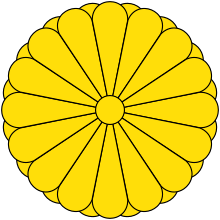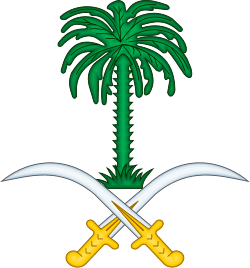Japan–Saudi Arabia relations
 | |
Japan |
Saudi Arabia |
|---|---|
Japan–Saudi Arabia relations (Arabic: العلاقات السعودية اليابانية, Japanese: 日本とサウジアラビアの関係) refer to foreign relations between Saudi Arabia and Japan. Official relations between the two nations were established in 1955.[1]
Since then Japan as the third largest economy on earth, also the second largest during major parts of the latter half of 20th century, and Saudi Arabia including the Holy Cities as the largest oil producer in the world have enjoyed their mutual interests. In 2015, Japan became the third-largest trading partner of Saudi Arabia, importing $45.4 billion in petroleum products and exporting $7.5 billion in finished goods.[2]
History
The first half of 20th century: Feeble ties between the Far East empire and the kingdom, then the inevitable breakdown
The first official contacts between the two nations occurred in 1938 when Saudi envoy to the United Kingdom, Hafiz Wahba, visited the Empire of Japan to attend the opening of the Tokyo Mosque. In the following year the Japanese envoy to Egypt, Yokoyama, visited Saudi Arabia and met with Ibn Saud of Saudi Arabia in Riyadh.
Both of the monarchs kept feeble ties for the following years; however, the Japanese Attack on Pearl Harbor in December 1941 made the Japan–US relations belligerent and it meant the coming breakdown between the Axis empire and the Kingdom of Saudi Arabia. Finally, in March 1945, the kingdom declared war on Japan and Nazi Germany.[3] As a result of the catastrophic war, Japan lost three million lives and all overseas territories, namely the Korean Peninsula, Taiwan, Manchuria, the South Pacific Mandate, the southern part of Sakhalin and all of the Kurils.
The latter half of 20th century: Rebirth of the Rising Sun and rapid growth of the kingdom protecting the Holy Cities
In 1953 the Japanese government sent its first delegation to the UK Economic and accelerated the process to culminate in the establishment of diplomatic relations between the two countries in 1955, and passed the economic relations between the two countries, an important station in the year 1957 as the Kingdom was granted the right of privilege to explore for oil It's a Japanese Arabian Oil Company.
In 1960, His Royal Highness Prince Sultan bin Abdul Aziz, later Crown Prince, Deputy Prime Minister and Minister of Defense and Aviation and Inspector General, Kln, when the then Minister for Transport Minister to visit Japan.[4]
In 1968, Japan vaunted economic miracle and overtook West Germany as the second-largest economy after the United States.[5]
The visit of King Faisal bin Abdul Aziz to Tokyo in 1971 strengthened their bilateral relations and it launched the most important stage in the history of Saudi-Japanese relations, which has seen many of the mutual visits of officials of the two countries.[6] Thereafter, the bonds of relations between the Saudi royal family and the Japanese imperial family were strengthened through their repeated visits.
In the year 1981, when Emperor Akihito and Empress Michiko were Crown Prince and Princess under the rule of Emperor Hirohito, Akihito and Michiko paid a visit to the most prominent kingdom in the Arabian Peninsula.[7]
And on behalf of the Custodian of the Two Holy Mosques King Fahd bin Abdul Aziz was attended by His Royal Highness Prince Nawwaf bin Abdul Aziz, crown emperor decrees year 1990, and in 1994 the Crown and the parent in Japan during a visit to the Kingdom.
In 1997, Ryutaro Hashimoto visited the Prime Minister of Japan at that time as part of the Kingdom of the Custodian of the Two Holy Mosques King Fahd bin Abdul Aziz.
In the month of October of the year 1998, he visited the Custodian of the Two Holy Mosques King Abdullah bin Abdul Aziz, Japan, when he was crown prince, and Saudi Arabia signed the agenda of cooperation with Japanese Prime Minister Keizo Obuchi, was His Royal Highness Prince Salman bin Abdulaziz, Emir of Riyadh region and later king, had visited Japan in April of the same year.
The first half of 21st century: Cooperation of the wealthy but stagnant country and ambitious kingdom on growth in non-oil sectors
In the year 2001 and visited the Japanese Foreign Minister Yohei Kono announced the UK initiatives in three areas; the promotion of dialogue among civilizations with the Islamic world and the development of water sources, and multi-wide political dialogue.
In 2010, China overtook Japan as the second-largest economy on earth,[8] but Japan is still the third-largest trading partner of Saudi Arabia.[2]
In March 2017, King Salman bin Abdulaziz visit to Japan and had a meeting with Japanese Prime Minister Shinzō Abe in Tokyo, where two leaders exchanged various opinions includes uncertain international security and the Saudi-Japan Vision 2030, bilateral cooperation on realizing the Saudi Vision 2030.[9] Afterwards, Saudi-Japan Vision 2030 plan was announced and disclosed.[1]
Economic relations
These special relations between the Kingdom and Japan have been translated on the ground and the special district is the economic reality of Japan finished second in the list of the most important trading partners of the Kingdom, with exports of 52,394 million Saudi riyals and imports of 91,341 million riyals in 2003.
In the area of the joint projects of the size of Saudi-Japanese joint projects in the Kingdom of 74 projects including 41 industrial projects, and (33) non-industrial projects with a capital of 67.45622 million representing the share of the Saudi side of the 70.74% and the Japanese side 05,25% and the rest to other investors, or 34.0%.
The two countries have signed an agreement on economic and technical cooperation from the year 1975, which also included the establishment of Saudi-Japanese Joint Committee to monitor the implementation of the terms of the agreement between the two countries.
The visit by the Custodian of the Two Holy Mosques King Abdullah bin Abdul Aziz when he was crown prince to Japan, one of the most important stations in the history of relations between the two countries, especially economic and technical as it was signed during the visit a joint declaration on cooperation between the UK and Japan for the atheist and the era of the twentieth century, which included Many of the pillars, which included confirmation of the leaderships of the two countries and their commitment to do their utmost to implement the program of joint cooperation and stressed the importance of the role of the private sector in promoting bilateral economic ties and agreed on the need to encourage and facilitate cooperation in the private sector in both countries in addition to the importance of cooperation for the development of trade relations and investment in the oil .
Was also signed to the program of joint cooperation between the UK and Japan, which includes the formation of four task forces, as well as the Joint Declaration for Cooperation in the field of Youth, Sports and Culture between the Government of the Kingdom, and Japan were also planning a visit to a delegation of Saudi businessmen to Japan aimed at the definition of export potential and capacity of the Kingdom and the opportunity to invest and establish projects involved, incentives and facilities available in this regard and strongly urged them to increase imports from the UK, and has been making an exhibition in Saudi Arabia in Tokyo and Osaka in 2000, was also signed in the same year on the bilateral agreement to open markets in goods and services with Japan.
Sports
Soccer
In 2002, Saudi squad for FIFA World Cup played against the German team in Sapporo on June 1, against the Cameroon team in Saitama on June 6, and against the Irish team in Yokohama on June 11.[10] All the three cities are located in Japan.
Karate: Cup of Japanese Ambassador
On 3 May, “the Cup of Japanese Ambassador” of Karate was jointly organized by the Embassy of Japan in Saudi Arabia and the Karate Federation in Saudi Arabia. A trophy and medals were awarded to the winners by H.E. Mr. Shigeru Endo,Ambassador of Japan to the Kingdom of Saudi Arabia. With the attendance of Mr. Ibrahim Abdulrahman, Vice President of Saudi Arabian Karate Federation, Mr. Humud bin Saud, Secretary General of Saudi Arabian Karate Federation and many Saudi people, this championship contributed to promoting the sports exchanges between Japan and Saudi Arabia.Embassy's Highlights 2012
References
- 1 2 Saudi–Japan Vision 2030 - March 2017
- 1 2 A solid foundation in Japan for strengthening friendships | Saudi Arabian Oil Co. - September 15, 2016
- ↑ Alan Axelrod, Jack A. Kingston "Encyclopedia of World War II" p.269
- ↑ Visit To Japan of H.R.H. Crown Prince Sultan Bin Abdul Aziz Al Saud
- ↑ Koichi Hamada "Japan 1968: A Reflection Point During the Era of the Economic Miracle," Yale University, August 1996
- ↑ King Faisal’s Visit to Japan | Islam In Japan Media - September 23, 2016
- ↑ Geoffrey Kemp "The East Moves West: India, China, and Asia's Growing Presence in the Middle East," p.124, Brookings Institution Press, 2012
- ↑ China overtakes Japan as world's second-largest economy | Business | The Guardian - February 14, 2011
- ↑ Japan-Saudi Arabia Summit Meeting | Ministry of Foreign Affairs of Japan - March 13, 2017
- ↑ World Cup 2002 - Match Details

